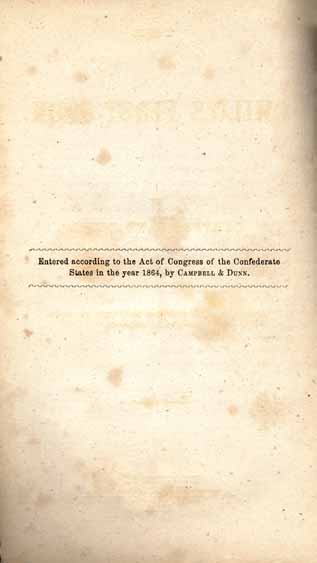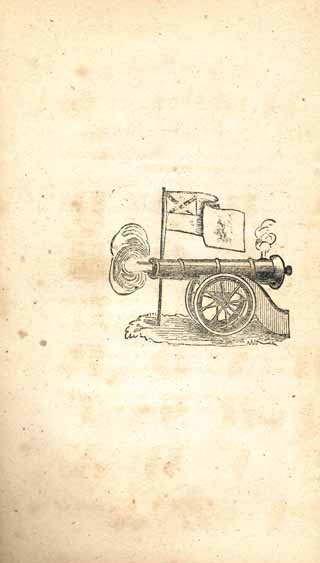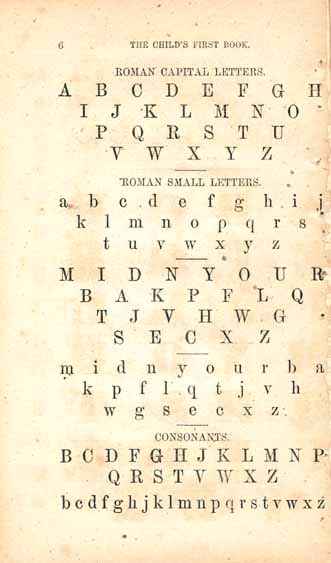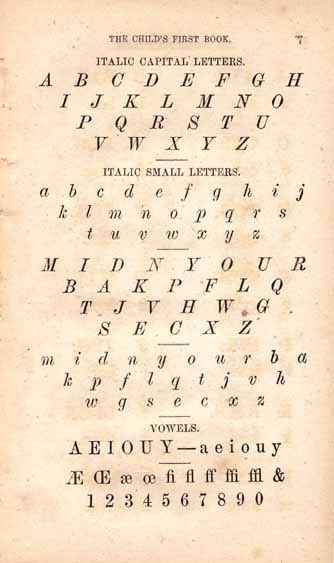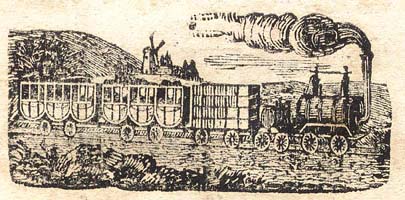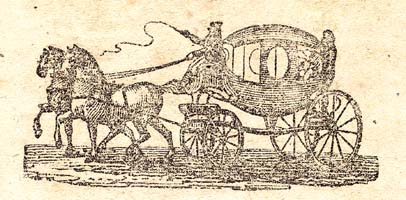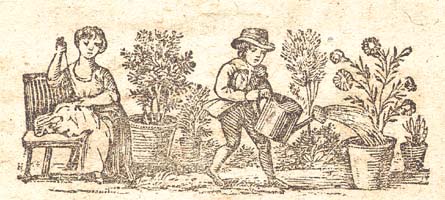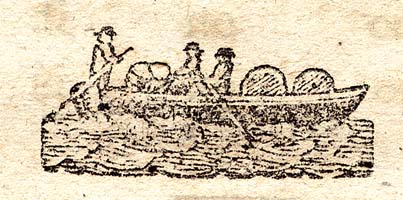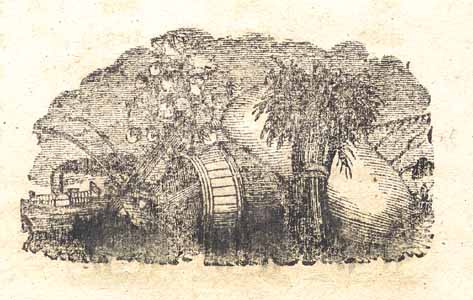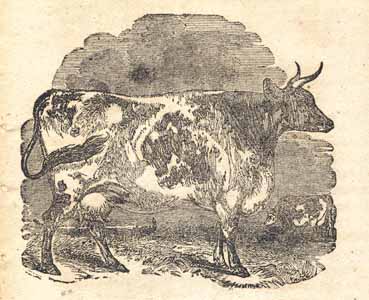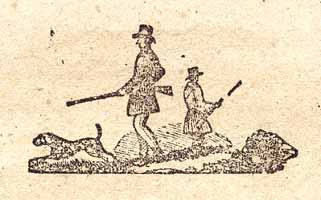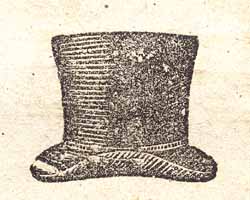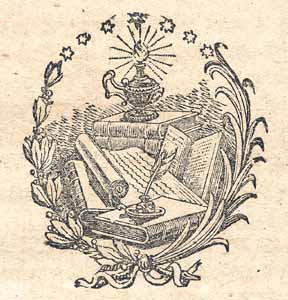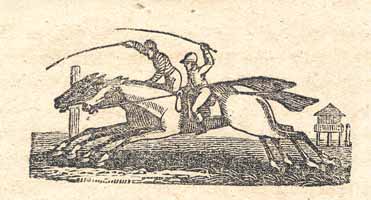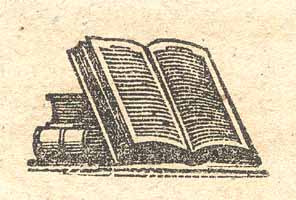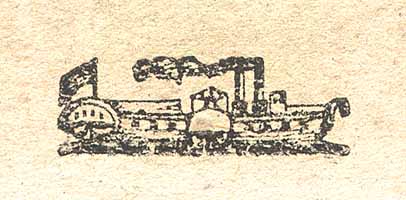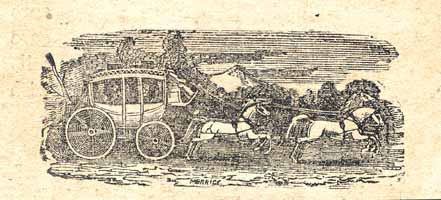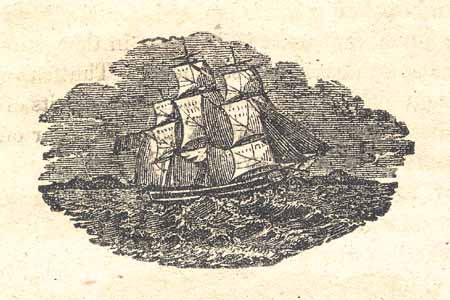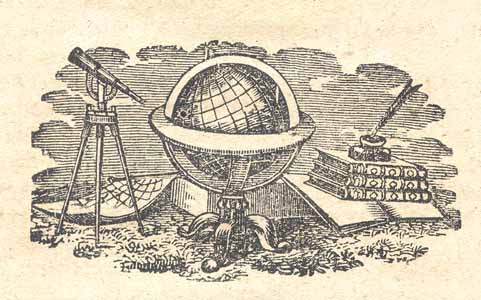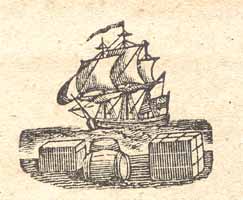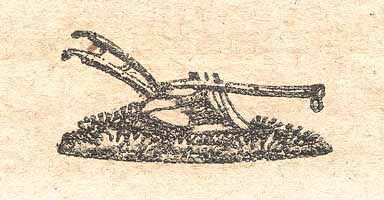The Child's First Book:
Electronic Edition.
Campbell, William A., 19th cent.
Dunn, William R. J.
Funding from the Institute of Museum and Library
Services
supported the electronic publication of this
title.
Text scanned (OCR) by
Jason Befort
Images scanned by
Jason Befort
Text encoded by
Elizabeth S. Wright and Natalia Smith
First edition, 2000
ca. 80K
Academic Affairs Library, UNC-CH
University of North Carolina at Chapel Hill,
2000.
Source Description:
(title page) The Child's First Book. By Campbell and Dunn. Approved
by the Education Association of Virginia Through Their Committee.
Campbell and Dunn.
48 p., 32 ill.
Richmond
Ayres & Wade.
1864.
Call number 4036 Conf. (Rare Book Collection, University of North
Carolina at Chapel Hill)
The electronic edition
is a part of the UNC-CH
digitization project, Documenting the
American South.
This electronic
edition has been created by Optical
Character Recognition (OCR). OCR-ed text has been compared against the
original document and corrected. The text has been encoded using the
recommendations for Level 4 of the TEI in Libraries Guidelines.
Original grammar,
punctuation, and spelling have been preserved. Encountered
typographical errors have been preserved, and appear in red type.
The publisher's
advertisement on the back cover has been scanned as an image.
Any hyphens occurring
in line breaks have been
removed, and the trailing part of a word has been joined to
the preceding line.
All quotation marks,
em dashes and ampersand have been transcribed as
entity references.
All double right and
left quotation marks are encoded as " and "
respectively.
All single right and
left quotation marks are encoded as ' and ' respectively.
All em dashes are
encoded as
--
Indentation in lines
has not been preserved.
Running titles have
not been preserved.
Spell-check and
verification made against printed text using Author/Editor (SoftQuad) and Microsoft Word spell check programs.
Library of Congress Subject Headings, 21st edition, 1998
Languages Used:
- English
LC Subject Headings:
- Readers (Primary)
- Spellers.
- Textbooks -- Confederate States of America.
- Education -- Confederate States of America.
- Confederate States of America -- Juvenile literature.
- Southern States -- Juvenile literature.
Revision History:
- 2000-08-11,
Celine Noel and Wanda Gunther
revised TEIHeader and created catalog record for the electronic edition.
-
2000-07-03,
Natalia Smith, project manager,
finished TEI-conformant encoding and final proofing.
-
2000-06-30,
Elizabeth S. Wright
finished TEI/SGML encoding
- 2000-06-28,
Jason Befort
finished scanning (OCR) and proofing.
THE
CHILD'S FIRST BOOK.
BY
CAMPBELL AND DUNN.
APPROVED BY THE EDUCATION ASSOCIATION OF VIRGINIA
THROUGH THEIR COMMITTEE.
RICHMOND:
AYRES & WADE.
1864.
Page verso
Entered according to the Act of Congress of the Confederate
States in the year 1864,
by CAMPBELL & DUNN.
Page 3
PREFACE.
In preparing this little work for children, the writers have aimed to give it four characteristic features:
First. To have a proper combination of spelling and reading lessons, the former being auxiliary to the latter. The lessons are so arranged, that no word is used in reading until it has occurred in the previous spelling lessons. This rule, however, is not strictly observed in the latter part of the book.
Secondly. To make the beginner familiar with one step before taking another; so that, in the child's own language, the book may not "become hard too fast."
Thirdly. To contain connected narratives that will interest the young reader, instead of disconnected sentences.
Fourthly. To present to the impressible mind of the child sound instruction in morality and true religion.
Whether these aims have been attained is submitted to the judgment of the teachers and parents who may use our little volume.
We have, in some instances, availed ourselves of the labors of others who have published books for children.
Page 4
Page 5
THE
CHILD'S FIRST BOOK.
Page 6
- A B C D E F G H
- I J K L M N O
- P Q R S T U
- V W X Y Z
ROMAN CAPITAL LETTERS.
- a b c d e f g h i j
- k l m n o p q r s
- t u v w x y z
ROMAN SMALL LETTERS.
- M I D N Y O U R
- B A K P F L Q
- T J V H W G
- S E C X Z
- m i d n y o u r b a
- k p f l q t j v h
- w g s e c x z
- B C D F G H J K L M N P
- Q R S T V W X Z
- b c d f g h j k l m n p q r s t v w x z
CONSONANTS.
Page 7
- A B C D E F G H
- I J K L M N O
- P Q R S T U
- V W X Y Z
ITALIC CAPITAL LETTERS.
- a b c d e f g h i j
- k l m n o p q r s
- t u v w x y z
ITALIC SMALL LETTERS.
- M I D N Y O U R
- B A K P F L Q
- T J V H W G
- S E C X Z
- m i d n y o u r b a
- k p f l q t j v h
- w g s e c x z
- A E I O U Y--a e i o u y
VOWELS.
- Æ Œ æ oe fi fl ff ffi ffl &
- 1 2 3 4 5 6 7 8 9 0
Page 8
| A | AXE. | B | BAT. |
| a | axe. b | bat. | |
| C | CAT. | D | DOG. |
| c | cat. | d | dog. |
| E | EGG. | F | FOX. |
| e | egg. | f | fox. |
| G | GUN. | H | HAT. |
| g | gun. | h | hat. |
| I | INK. | J | JUG. |
| i | ink. | j | jug. |
| K | KITE. | L | LI-ON. |
| k | kite. | l | li-on. |
| M | MUG. | N | NAG. |
| m | mug. | n | nag. |
Page 9
| O | OX. | P | PIG. |
| o | ox. | p | pig. |
| Q | QUEEN. | R | RAT. |
| q | queen. | r | rat. |
| S | SUN. | T | TOP. |
| s | sun. | t | top. |
| U | URN. | V | VICE. |
| u | urn. | v | vice. |
| W | WING. | X | EX. |
| w | wing. | x | ex. |
| Y | YOKE. | Z | ZE-BRA. |
| y | yoke. | z | ze-bra. |
Page 10
| ba | be | bi | bo | bu | by |
| ca | ce | ci | co | cu | cy |
| da | de | di | do | du | dy |
| fa | fe | fi | fo | fu | fy |
| ga | ge | gi | go | gu | gy |
| ha | he | hi | ho | hu | hy |
| ja | je | ji | jo | ju | jy |
| ka | ke | ki | ko | ku | ky |
| la | le | li | lo | lu | ly |
| ma | me | mi | mo | mu | my |
| na | ne | ni | no | nu | ny |
| pa | pe | pi | po | pu | py |
| ra | re | ri | ro | ru | ry |
| sa | se | si | so | su | sy |
| ta | te | ti | to | tu | ty |
| va | ve | vi | vo | vu | vy |
| wa | we | wi | wo | wu | wy |
| za | ze | zi | zo | zu | zy |
| ab | eb | ib | ob | ub |
| ac | ec | ic | oc | uc |
| ad | ed | id | od | ud |
| af | ef | if | of | uf |
Page 11
| ag | eg | ig | og | ug |
| ak | ek | ik | ok | uk |
| al | el | il | ol | ul |
| am | em | im | om | um |
| an | en | in | on | un |
| ap | ep | ip | op | up |
| ar | er | ir | or | ur |
| as | es | is | os | us |
| at | et | it | ot | ut |
| av | ev | iv | ov | uv |
| ax | ex | ix | ox | ux |
| az | ez | iz | oz | uz |
| am | ah | go | to | if | be | ye |
| an | ma | lo | of | in | he | by |
| at | pa | no | on | it | me | my |
| as | do | so | ox | is | we | up |
Page 12
READING IN TWO LETTERS.
| I am in. | He is in. |
| We go in. | Do go in. |
| He is by me.Am I by it? | |
| No, I am on it. | He is by it. |
| Go in if I go. | He is in, as I am. |
| My ma is in. | So is my pa. |
If he is in, so am I.
Page 13
Am I up? Is he up?
No, we go up. Do go up as I do.
It is on me. No, go on up.
If I go up, go up to me. No, go on by me.
I am up: so am I.
It is as if an ox is on it.
| It is an ox. | Is it an ox? |
| No, it is pa. | |
| If it is pa, he is on an ox. | So he is. |
If he be by an ox, is be on it?
| No, he is at it. | Is pa on an ox? |
| No, ma is on it; pa is by it. | Lo, it is so. |
He is to go on it, if I do.
I am to go on it.
If I go on it, is it my ox?
It is my ox, or it is to go to me.
If it is to go to me, it is my ox.
Go on ox.
Page 14
LESSONS IN THREE LETTERS.
| had | cut | did | try | log | toe |
| bad | but | bid | cry | bog | doe |
| gad | hut | hid | fry | cog | foe |
| lad | jut | lid | pry | dog | hoe |
| mad | nut | rid | and | fog | off |
| sad | rut | Tom | axe | hog | his |
Tom had an axe. And as he did try to cut a log, he cut off his toe. He ran off to cry, and let his toe lie on the log.
| Fan | box | bat | top | big |
| ban | fox | fat | fop | dig |
| man | old | hat | hop | fig |
| pan | she | mat | lop | jig |
| ran | the | pat | mop | pig |
| tan | her | rat | pop | rig |
| van | lie | sat | sop | wig |
| bed | got | lap | fly | paw |
| fed | cot | cap | ply | caw |
| led | dot | gap | sly | jaw |
| red | hot | hap | eye | law |
| wed | jot | wap | arm | maw |
| was | lot | nap | art | raw |
| out | not | sap | ark | saw |
Fan had an old box. It sat on the top of a big bed; and a bat got in to it. She put it on her lap; and as the lid was up, the bat got out. It did not fly, but ran up her arm as a rat; and its paw put out her eye.
Page 15
Mol
pen
let
set
jay Dan
den
pet
wet
may off
fen
get
way
pay oft
hen
jet
bay
ray nor
men
met
day
say for
ten
net
gay
lay oak
wen
pet
hay
nay
The old cat, Mol, got a rat in the pig pen. As she had her paw on it by the pen, the big dog, Dan, ran at her. She had to let the rat go, and get up on the top of the pan, out of the reach of the dog. As she did so, off ran the rat, and hid in an old oak log. So old Dan did not get the cat nor; did the cat get the rat.
| Ann | lie | yet | leg | kid | kip |
| all | die | let | beg | cup | dip |
| eat | pie | met | keg | sup | lip |
| ear | tie | pet | peg | own | rip |
| its | vie | set | put | one | sip |
| elk | hit | run | pun | bow |
| elf | let | bun | sun | low |
| elm | met | dun | tun | mow |
| who | pit | fun | eye | row |
| fit | sit | gun | die | sow |
| bit | wit | nun | man | tow |
Page 16
An elk is not so big as an ox. It is not fit for a pet.
It can run so as to get out of the way of a dog; but it
can not get out of the way of a gun or a bow. A man who had a gun hit an elk in the eye; and so
it did die.
see
too
bug
mug bee
coo
dug
rug fee
loo
hug
tug him
woo
jug
sly dim
air
lug
ply rim
end
pug
try
A sly fox did try to get a fat old hen to eat. She did not see him as he got in-to the lot; for a fog was in the air; and she had her eye, too, on a bug in the hay. The sly fox got up to her, and had his paw up to put on her; but a dog, who lay in his bed in the end of the lot, saw him, and ran at him. And so the hen got off, and the fox had to run to get out of the way of the dog.
Page 17
Ned
now
sow
far fed
bow
vow
bar can
cow
pop
car man
how
cop
mar why
mow
was
par use
row
war
tar
Page 18
Ned had a gun. Why he got it, I can not say. But
it was not a bad one; and he was fit to use it. One
day he saw a mad dog not far off, and put his gun to
his eye. Pop, the gun did go, and hit the dog. He
bit no one now; for he did die.
Sam
new
Lou
say cam
dew
you
are dam
few
use
nut ham
hew
our
pen jam
jew
ink
hen mam
mew
irk
old ram
pew
all
see
Sam has a new hat and a new box to put it in. He can put it on if he got in the sun; but he has no use for him in bed. He has an old cap, too; but it is not fit for him in the hot sun; nor to put on to go to see Lou.
Page 19
My pen and ink are so bad I can not say all I had
to say to you. I got the ink out of a red nut; it is
now dry. And I got the pen out of our old hen. But
tho' my pen and ink are bad, you can see all I do say;
and do not let it all be of no use to you.
Bob
rum
boy
sin
God cob
gum
coy
bin
hod fob
hum
joy
din
nod job
mum
own
fin
pod mob
sum
ear
gin
rod rob
rye
ill
tin
sod sob
eye
inn
win
act
Bob got a jug of rum at the inn. The rum was of no use to him. But he got rum, or may be it was "old rye." Day by day, he put the jug to his lips; and did not use cup or mug. You can see by his red eye it is bad for him.
Page 20
One day, in a mad fit, the rum got in-to him; he hit his own boy, and cut his lip and his ear, but did not put out his eye. Bob was ill, too, and had to lie in bed as if to die. Yet he saw he was not fit to die; and he did cry to God; "Oh! God, I do sin, day by day. I am far, far in the way of sin. Woe is me if I die as I am. But, oh! my God, let me not die in sin."
His cry did go up to God, and he did not let him die in sin. Bob got out of bed a new man. He did not use his jug now, nor go to the inn; but he did act as if the eye of God was on him.
| Hal | yon | bag | jag |
| Jim | bon | nag | lag |
| who | con | cag | mag |
| tho' | don | fag | rag |
| yes | dry | gag | tag |
| yet | sky | hag | wag |
| age | apt | sin | mud |
| ace | act | mix | bud |
| ale | aft | fix | cud |
| ate | ash | pix | won |
| oat | ask | rix | son |
| oak | asp | wee | ton |
Page 21
Hal
is on a bay nag. Her dam was red; but she
has no red but a wee bit on the tip of the ear. She is
fed out of the bin or the oat mow; and has new hay
too, and rye, if it can be got. She has a dry bed to
lie on. She is gay, but is not apt to run off. Her age
is six. Hal had a bet to run his nag; but his pa had bid
him not to run nor to bet. But Hal was a bad boy,
and did not try to do as he was bid. So one day he
set off on his gay nag. As he was to be off all day,
he put a bun or two and a bit of ham in a bag, and
got cut hay and rye for his nag. His aim was to get
to the boy who was to run for the bet. He met Jim,
who had a nag too. He was the boy for Hal. Hal.--Ho, Jim, can you run for the bet to-day? Jim.--Yes, Hal, and win too. Hal.--I bet two to one on my nag. Jim.--If you bet ten to one, my nag can win. Hal.--Let us run to yon oak we see far on in the way. Jim.--No, Hal; it is too far; and the way is not all dry. Let us
run to the ash we see mid-way. The way to it has no mud; it is all dry. Hal.--We can do as you say.
Hal won the bet; for he got to the ash, as Jim was
a rod off. And now Hal had joy; but Jim was sad;
for he had to pay the bet. The sun was far up in the sky; and Hal got out the
cut hay and rye for his nag; and Jim got of it for his.
He got out, too, all he had in his bag to eat; and he
and Jim ate it all up. But tho' Hal had joy as he won the bet of Jim, he
was sad in the eve: his fun was now all woe; for he
did as his pa had bid him not to do; and now he had
to go to him. He was in a sad fix; and art and wit
did not get him out. The rod was his lot. A boy had an old hen and a big red dog. He put
a box in a pen for his hen; and she sat in it to lay an
egg, But the big red dog was bad, and ran in-to the
pen and bit the hen and ate up her egg. But the hen
got out of the way of the dog, and ran off out of her
box and out of the pen in-to the lot. A bag by the
pen had ice in it; and she did go on the ice to get far
out of the way of the dog. As she did so, the boy saw
the dog try to do as she did; and he was sad to see it;
for he has bit his hen, and his aim is to do it now too,
if he can get to her. But as he did try to go on the
ice, he got in-to the mud up to his eye. He put his
leg on a log in the bog to get out of the mud; but it
was as if it had oil on it. As the boy saw it he had
joy; for the old hen was out of the way, and the bad
dog was yet in the bog.
Oh! God, who art my God, in all the way I go, be
not far off. May I see no ill nor woe to-day. Aid me
to do as I am bid; and to act as if the eye of God
was on me all the day. And let me do to all as all
are bid to do to me. Try me not by thy law; for day
by day I go far in the way of sin. But let me do no
sin to-day. Do all I ask, not for me, but for thy son.
A-men. Oh! my God, God of the sky, and air, and sea, and
of all men, ope thy ear to my cry; and let not my sin
be on me; for oft did I sin to-day. May I put off the
old man and put on the new man. May I pay my
vow to God, and do all his law. Cut me not off in
sin; but if I die ere I see the day, may I be fit to die,
and go to God in joy. May thy Son ask all for me.
A-men. Sam was a big boy, and he had a pet lap dog. He
let it lie in his bed as he lay, or he let it sit in his lap
as he sat. He fed it out of all he had to eat; and it
was as fat as a fed pig; yet it was not so big as a kid
of a day old! Was it not a pet? It had a red tip to one ear, and it had one red leg;
so now you see why it was dog Red Leg. If Sam bid
it put up the red paw on his lap, the dog did as it was
bid, and put up no paw but the red one; or if he did
say to it, "Go, Red Leg, and get me my hat off the
pin," Red Leg ran for the hat, and got it off the pin
for Sam; and got him no hat but his own. Now, Red Leg was a dog of wit, as you may see;
and Sam was a lad of wit, too; and he had got a gun;
for he was old and big, and fit to use one; and he let
no one get at it, or use it, but men. But Bob (a boy
who saw him get it) was sad, for he had no gun. He
was not fit to get one, tho' he was as big and as old as
Sam. Bob was son to an old man who lay ill in a cot not
far off. The old man had no son but him. He had
had a son who was not so old as Bob; and he was not
bad. He was fit to die; so God had let him go up to
Him in joy; and now the old man had no son but
Bob; and he was a bad, bad boy. Bob had no dog, nor no gun; but he had a pet of
his own, and it was a bad one. You may say it was
fit for a bad boy to get a bad pet. He had set a gin
one day, and he got an old mag-pie in it; and tho' the
mag-pie had its leg cut in the gin, Bob did not let it
go, but put it up in a box, and had it for his pet. Now Sam and his dog, and Bob and his mag-pie,
set off one day, to sit on the dry sod in the sun. The mag-pie sat by Bob, and Red Leg lay on the
sod by Sam. The eye of the dog was on Sam; but
his lip and his leg lay on the top of the gun. Now, Bob was in joy to see the lip of the dog at the
top of the gun. "It may go off! it may go off!" said
the bad boy. "The gun may go off, and hit Red Leg,
and vex Sam. But my pet mag-pie cannot be hit by
the gun; for the top of the gun is to Sam and to his
dog, and not to me or to my mag-pie." But the gun was not in the way to go off as it lay.
It was a new gun, and it was an odd one too. If Sam
was to let off his gun; he had to fit a tin cap, or cup, on
a peg in the gun; and the cap was to be hit on the
top, to set the gun off. Now Sam had put a cap on the peg of his gun; and
Bob saw how he did it: for he had his eye on the
gun, and he said, "Oh! if it may but go off, and hit
the dog! He is a bad old cur, tho' he has a red leg;
and he bit my mag-pie one day. So do, gun, go off,
and hit him if you can." But the gun did not go off, tho' Bob bid it. So he
ran and got a log--a big, big log, (he did not let Sam
see him get it,) and he let the log hit the cap of the
gun on the top, to set off; and the gun did go off:
and, how can I say to you all the ill it did?
It did not hit Red Leg; but it hit the pet mag-pie:
and Bob saw her lie on the sod, and he was sad, and
did sob and cry. To hit the mag-pie was not all the ill the gun did.
The old man of the cot was not far off, and, sad to say,
the gun hit him; yes, it hit him, and he lay on the sod,
as if to die! Bob did not see the gun hit the old
man; but it had cut him on the leg: and tho' he did
not cry for the cut, yet, as he lay on the sod, he did
cry to see one who was his own son so bad a boy. Bob, now, as the mag-pie lay on the sod, saw how
far a gun can go; and he saw, too, how bad it is to
set one off; yet he was not so sad for the old man, as
for his own pet mag-pie: and he said, "Oh! why did
the gun go so far? why did it not hit the old cur who
had his lip on it, and who bit my pet?--why did
it not hit him?" So he did cry and sob, and was
sad. But Sam said to him, "Do not cry, Bob: the mag-pie
may not die. It can fly yet, you see; and, may
be, it is not so ill as to die." Bob.--"Oh! yes, sir, my mag-pie is ill; you saw it
try to fly, but it can not get up. You may see it now
fix its eye on me, as if to ask why I let off the gun at
it? No, no, my mag-pie can not fly, nor can it sit.
It can but lie on the sod and die. And now I see it
die! Oh! how sad I am!" And Bob lay on the sod
by his pet; and did cry, and sob, and hit the sod, as
as we oft see a bad boy do.
The old man of the cot saw Bob lie on the sod: and,
ill as he was, he got up, to ask if he was hit by the
gun: but, as he saw his son was not hit at all, he said
to him, "Oh! Bob, you are a bad boy: I saw you set
off the gun; and you see how it has hit me, and cut
my leg! You let it off to hit Red Leg, and did try
to aim it at him; but it did not go off so as to hit the
dog; no, it hit the mag-pie you had for a pet, (as was
fit for it to do,) and you saw it die. "Now, you see the gun has hit me too, and I may
die, as the mag-pie did; and, if I do, who can be to
you as I am? A bad boy can get no one to aid him,
and how can you get on if I am not by you? Oh! my
son, my son! bad as you are, I am sad for you!" Bob got up off the sod, and did fix his eye on the
cut his pa-pa had got. It was not for his pet mag-pie
he was now sad. No! he was in woe to see his pa-pa
so ill. Sam was sad to see the old man ill and sad to see
Bob in woe; and he said, "Bob is in woe, sir, to see
you so ill; and he is sad, too, I see, for his own sin;
so he may yet get off his bad way, and be as a son to
you. Do not, I beg, let him see you in ire. He may
be of use to you now you are ill; and he can not be so
sad, if you let him be of use to you." Bob.--"Oh! do not ask him to let me be of use to
him. I am too bad a boy. I, who set off the gun,
and hit him, can not be as his son." Sam.--"You can try to be of use to him, and to be
as a son to him now he is ill; can you not? Bob did not say yes, or no; but he did cry as he saw
the sad cut on the leg of his own pa-pa; and the old
man said to him, "You see, Bob, the eye of GOD is on
us all. Sin can not be hid: for GOD can see all who
sin. He saw you hit the gun, and set it off, as you sat
on the sod: and He did to you as you did try to do to
Sam. You did try to vex him, and GOD saw fit to vex
you. But GOD did it to let you see how bad you are,
so as not to let you go on in sin." Bob.--"Oh! I was bad! bad to Sam, who can vex
no one; but, oh! how bad I am to you! You can not
now let me be as a son to you." The old man, and Bob, and Sam, got in-to the cot;
and as Bob saw his pa-pa so ill, and the cut on his leg
so red, he ran to his bed, and lay on it in woe, and did
ask GOD not to let his pa-pa die. "Oh, GOD! I am a bad, bad boy," said he "a
boy of sin! But I am sad for all the ill I did, and
now I ask Thy aid to get me out of the way of sin.
Thy Son can see all we do, and He has an ear to all
we say; oh! let all I now do be fit for His eye; and
let all I say be fit for His ear. And, oh! do not let
my pa-pa die! But say I may yet be a son to him;
and let me be Thy son now and to my end.--Amen." So Bob got up, and ran to his pa-pa to try to be of
use to him; and GOD let him be of use, and let him
get all he had to ask for; and in a day or two the old
man was not ill, and he said to Bob, "You do not vex me now, my boy, for you try, I
see, not to be bad; and you see how GOD can aid
us all to get out of the way of sin, if we but try to
do so." Then Bob said to Sam, low in his ear, "Oh! Sam,
I am in joy now; pa-pa said, 'my boy.' Oh! I see
he can let me be his son yet." "Yes," said the old man, "I can let you be my son.
You are my own son now. May GOD let you be His
son too."
HAL AND JIM.
Page 22THE DOG AND THE HEN.
Page 23 A MORNING PRAYER.
AN EVENING PRAYER.
SAM AND HIS DOG RED LEG.
THE LAP DOG.
Page 24THE DOG AND GUN.
Page 25
Page 26A BAD SON.
Page 27A SAD PA-PA.
Page 28THE END.
Page 29LESSONS IN FOUR LETTERS.
nice
book
bead dice
cook
read fice
hook
lead lice
look
meed mice
nook
then rice
rook
when vice
took
glen keep
must
well deep
bust
bell peep
dust
cell weep
gust
dell good
just
fell hood
lust
sell here
rust
tell
Page 30
THE GOOD BOOK.
Here is a nice book for Ann. She may look at it; and she may read in it; and she may keep it for her own. But then she must be good, and do as we bid her, and try to do well.
| beat | says | drum | talk |
| feat | days | crum | balk |
| heat | jays | grum | walk |
| meat | lays | love | your |
| neat | pays | dove | four |
| peat | rays | Lord | pour |
| seat | ways | with | come |
| gone | have | boys | some |
| land | mine | place | need |
| band | dine | face | deed |
| hand | fine | lace | feed |
| sand | kine | mace | heed |
| wish | line | pace | reed |
| dish | nine | race | seed |
| fish | pine | give | weed |
| said | vine | live | earn |
Page 31
| made | poor | more | tore |
| bade | boor | bore | wore |
| cade | moor | core | part |
| fade | hurt | fore | cart |
| jade | thou | gore | dart |
| lade | that | lore | hart |
| rade | high | pore | mart |
| wade | nigh | sore | tart |
| take | hope | save | will |
| bake | lope | cave | bill |
| cake | mope | gave | fill |
| lake | pope | lave | gill |
| make | rope | pave | hill |
| rake | home | rave | kill |
| sake | dome | wave | mill |
| wake | soul | help | pill |
| rill | both | pray | hear |
| sill | doth | fray | in-to |
| till | loth | gray | ar-my |
| glad | bray | tray | o-ver |
| clad | dray | wray | la-dy |
THE DRUMMER BOY.
I met a boy one day, who had gone in-to the army to beat the drum, and who says he has love for his Lord. As I love to talk with the boys in the ar-my, I said to him:
"Did your ma wish you to come in-to the ar-my?"
"Yes, sir; she said, 'sons all o-ver the land have gone to the war, and I must and do give mine.'"
Page 32
"May be she had need of the pay you can earn and that made her give you up."
The poor boy was hurt and said: "It was not the pay, sir; it was more than that; it was not the pay at all; for she said to me, 'You can do your part, my boy, for the land. For if you will beat the drum, you will take the place of a man.' I am here for our land, sir--to help to save my home."
"You are a fine boy," said I, "and your ma a la-dy of high soul. I hope God will save her to you and you to her, and give us a land fit for you to be your glad home."
"If you did but hear my ma pray," said he, "you must see that we have both a God and a land."
| Loaf | rags | shoes | feet |
| pale | thin | said | look |
| poor | here | want | more |
| than | made | took | soon |
| kind | this | good | will |
| give | coat | sure | them |
| have | wear | cold | rock |
| must | hurt | past | wish |
| make | glad | with | nice |
| pair | weak | such | help |
THE KIND MAN.
I saw a man buy a loaf, and he met a boy all in rags; the boy had no cap or hat on, no shoes at all on his feet, and he was pale and thin. The man said to the boy, "You look ill my lad; here is my loaf
Page 33
for you; you look as if you want it more than I do. The boy made a bow, took the loaf, and soon ate it up. This man was kind and good, was he not? If you see that boy, will you give him an old coat and a cap? I am sure he wants them; and you have a coat that you do not wear now.
How the cold and the rock must hurt his feet! Will you let him go by and not wish to make him glad with a new pair of shoes? He is poor and weak, and you are not so. Give to such and help them, and God will not let you want.
| aunt gave when hear |
| came book hand know |
| John kiss come dare |
| read dear next full |
| well Jane year tales |
| have lend hope sure |
| shall take find care |
| that tear much soil |
| fond none dunce wish |
THE KIND AUNT.
My aunt came to see me to-day, and she gave me this new book. Look, Ann; look, John, what a nice book. I will try to read well; for my aunt, when she gave it to me, took me by the hand and gave me a kiss, and said, "Now, my dear Jane, I give you this book, as I hear you wish to know how to read; and when I come to see you next year, I hope I shall find that you read well." I will try to read well, as I wish so much my dear aunt may be as fond of me as I am
Page 34
of her, and she can not be fond of me if I am not good. When I have read my book, Ann, I will lend it to you; for I dare say it is full of nice tales, and I am sure you will take care of it, and not tear it or soil it. John says none but a dunce will tear or soil a book. How glad I am to have a kind aunt and a new book.
| quite | dark | dusk | bird |
| fast | flies | time | they |
| hide | holes | wall | tree |
| then | their | food | owls |
| hour | moths | bees | buzz |
| does | sing | cage | head |
| wing | tell | what | star |
| moon | just | like | four |
| five | count | pray | late |
THE DUSK HOUR.
The sun is set, but it is not quite dark yet; it is dusk. I see a bird; how fast it flies past me! That is not a bird, it is a bat. Bats do not fly in the day time; they hide in holes in a wall, or a tree, till it is dusk, and then they fly out, and find their food.
Owls fly out at the dusk hour, and so do moths.
Page 35
I do not hear the hum of the bees nor the buzz of the flies now; my bird does not sing; he sits in his cage, and hides his head in his wing.
Look up at the sky and tell me what you see. I see a star, and I see the moon, just a part of it; it looks like a bow. Now I see two stars; oh! more than two; four, five, six, more than I can count.
Pray put me to bed, now; I do not wish to sit up late; it is not good for me.
THE COT BY THE SEA-SIDE.
[In words of four letters. A few words of five and six letters are intentionally introduced.)
HOME.
Ned was the son of a man who used to live by the sea side. His pa, with Ned and Ma-ry, had a nice
Page 36
home in a cot on a hill, so that they were a-ble to look far out up-on the sea. In the yard, to the left of the door, was a line old oak. In the back yard, near the walk, was a wide elm. They used to sit by this elm in the cool of the day, or e-ven at mid-day; for the tree kept them from the heat of the sun. Here they had a view of a fine, wide vale, that lay to the west of the cot; or they sat by the oak to feel the cool wind, and look out up-on the sea, that came up to the foot of the hill on the east.
As they sang or read by the elm, Ned used to sit and play with Ma-ry, who was not so old as he was by a year or two, or go off and feed his pig, or run with his cat and dog up and down the yard, and now and then stop to hear his pa and ma sing; for be was fond of this, and he soon knew how to sing a song or two him-self.
When they sat by the oak to talk of days gone by, as oft they did, and try to look in-to time to come, Ned used to look out on the deep, blue sea, and find much to fix his eye. Now, he saw a bird that sat up-on the cliff, dart down and skim o-ver the sea, and then rise high in the air, and come back to the same spot. Now, he saw a ship pass by, in-to the bay or out of it. If the wind blew hard, he saw wave run up-on wave, and dash up-on the cliff at the foot of the hill, or leap over a high rock that rose out of the sea far off from the land. If it was morn, he saw the sun rise out of the sea and pass up in-to the blue sky.
This was a dear spot to Ned; for he had so oft sat here and seen all this, with his pa and ma and Ma-ry. But more dear still was the fire side in the cot.
Page 37
THE STORM.
Ned's pa was wont to stay much out at sea. And when Ned had come to the age of six, and Ma-ry was near four, he went out in a ship to be gone from home a long time. But the day at last came when he had told them to look for him home.
They all sat by the old oak, and kept a look-out, to see the ship he was to come in pass in-to the bay. Now a big ship was seen in full sail but soon it was gone; for the wind blew hard, and it kept on its way. Then came one in the face of the wind, and cut each wave as it met it. It had no sail; but its big, dark pipe told that it went by steam, and not by the wind. And not far off, a row boat with one sail, that they had to furl, ran in-to the bay to keep safe un-til the wind was calm.
The wind blew more and more, and at a late hour of the day they saw a ship run up-on the high rock far out in the sea, and a huge wave dash o-ver it. It went down, and was lost, with crew and all on it; for there was no time nor way to save any one.
They did not know what ship it was, nor who was
Page 38
on it; but they went to bed sad, for Ned's pa had not come home, and what if he were in that ship!
Next morn came the sad news. The fear was true; he was in that ship, and went down with its crew. He came no more to his neat cot and the dear ones in it. He went to be at rest with his GOD.
AT SCHOOL.
It was now a sad time at Ned's home. He and his ma and Ma-ry were all. One seat by the fire had no one it. At morn and eve they had no one to sing and pray with them. They were sad, too, when they sat down to eat; for they did not now e-ven look for him to come back and take his seat with them.
Ned's ma now made him learn to read in a book his pa gave him as he last went a-way. And Ma-ry, too, now and then, came to look at the pig and dog, and the hen and bird, and the boy and girl, that were in the book; but she did not tear it. When Ned was a-ble to read well in this book, his ma sent him to a
Page 39
man who had ma-ny boys with him. She gave him a new book, and a pen, and a slate.
Ned was a good boy here; and when he went home at eve his ma was glad to see him; and Ma-ry came out to meet him in a glee; for she had no one to play with her when he was from home.
When it was warm, they lay on the turf by the old oak; and Ned made a dog or cat for Ma-ry on his slate. He had now al-so a new book with a map in it; and he told Ma-ry that the part in-side the red line was land, but that out-side was the sea. And they saw an isle out in the sea, to which pa had gone when he left home the last time. It had the ve-ry name he used to tell them at home: Ned read it on the map, "Cu-ba," This did not pass out of his mind. But he oft told his ma of it, or got his map to show it to Ma-ry.
GONE TO SEA.
Ned had kept in mind much of what his pa had told him of what he saw o-ver the sea. He had, too, all his life seen ships, and men who had been to sea. And when he was six and ten years old, he had a mind to go to sea him-self. But his ma did not wish him to go; for the loss of his pa was yet in her mind, and it
Page 40
would be sad to have her son meet the same fate. But Ned, tho' he was a good boy, and, for the most part, did as his ma told him, yet had a will of his own. And this time, he was not kept back. He said he must see Cu-ba, and then go al-so to some land over the sea.
He soon got a place in a fine, big ship; and then told his ma and Ma-ry good-bye, and set sail. He saw much that was new to him on the trip; but it did not make him glad; for he was all the time kept sad by the fact that his ma did not wish him to go from home. Morn and eve this was in his mind; and he lay up-on his bed till a late hour ere he shut his eyes.
But Ned was not a-ble now to turn back, as the ship kept on its way. And soon Cu-ba was seen far off to the east. Ned now got high up on a rope by the mast to see what was to be seen. But he did not run up and down the rope with ease like the old tars. It was new to him; and, just as the ship went by a point of land, not far from the place to stop, his foot gave way, and be fell in-to the deep. A boat was let down to save him; but Ned was a-ble so swim; and, as the land was not far off, he did not wait for the boat, but swam to the land and was safe.
But the e-vil of his case did not end here; for no one was with him, and he knew not how to go, nor for whom to ask. At last he found his way to a large city. But here he was more lost than in the wood where first he came to land; for, tho' he met men each step he took, he knew no one. He did not find e-ven one of the crew of his own ship. At last he went to a room in an inn by him-self. Here he lay down up-on his bed, and had not a soul to talk to of all the woe he felt.
Page 41
As thus he lay, he felt how sad, it was to be where
he knew no one; and it was more sad to have come
when his ma did not wish him to do so. Oh, that he
were a-ble to tell her all he felt! But she was far a-way
o-ver the wide sea. Then it came into his mind that
One was near, to whom we may tell all our woe. And
he did try to look to GOD, and tell Him all the woe
and sin he felt. And he told not on-ly the sin he had
done when he came from home and left his ma, but
al-so the sins of all his life. He kept back none. Ned's ma had oft told him not to sin, and when he
did sin, to go to GOD and seek his mer-cy. And he
knew well that it was sin to do what GOD bade him not
to do, or not to do what GOD, in his word, bade him
do; and he knew that oft he had done sin; but not till
he lay up-on his bed in that lone room, and his mind
ran back over the past, did he feel the e-vil of sin.
And here he went to GOD, and thus did he pray: "Oh, my GOD, I am full of sin, and not fit to lift my
eye to Thee; yet have mer-cy up-on me; show me Thy
love, and take a-way my sins; blot them all from Thy
book, and make me a new man, for the sake of Thy
Son, who has died to save us from our sins." His mind was now at rest; for he gave his heart to
GOD, and found mer-cy in Christ. He soon af-ter came
back to his home in the neat city by the sea side, to
make glad the heart of his ma, by a new life of love
to GOD.
THE RETURN.
Page 42LESSONS IN WORDS OF FIVE AND SIX LETTERS.
brave
these
think
right fine
come
Will
Hale going
have
road
with great
ba-by
shame
first long
wait
brow
cheek told
word
bade
strong prove
them
till
noble would
from
house
leave should
fact
where
which
WHO IS THE BRAVE BOY?
Hear these boys and tell me which you think was right and brave:
"Oh, yes, that is fine! So we will! Come on now! There is Will Hale! Come on Will; we are going to have a ride on the road. Come with us!
"Yes, if my ma will let me. I will run and ask her," said Will.
"Oh, oh! so you must run and ask your ma! Great ba-by, run fast and and ask your ma if you may go! Have you no shame! I did not ask my ma." "Nor I," "nor I," said all the rest.
"Be a man, Will," said the first boy. "Come with us if you do not want to seem base, as long you as you live." "Do you not see all of us wait for you?" His brow, eye, lips, cheek, all told how that word base stung his heart.
Will he prove that he is base by go-ing with them? No.
"I will not go till I ask my ma!" said the noble
Page 43
boy. "And I am not base. I told her I would not go from the house till she gave me leave; and I should be base in fact if I were to tell her a lie!"
Was not Will Hale brave as well as good? Did He not do right?
| deed | ev-er | were | life |
| seem | bright | sweet | there |
| thing | earth | worth | liv-ing |
| your | pil-low | vest | call |
| mind | maid | fall | pass |
| need | lit-tle | can-dle | throws |
| beams | shines | world | true |
| gives | warmth | makes | heart |
| which | done | fail | who |
A GOOD DEED.
Did you ev-er do a good deed? Were you not glad of it, and did not life seem more bright and sweet for it? You felt as if there was one thing on earth worth liv-ing for. When you put your head on your pil-low to rest, was it not sweet to call to mind the joy you had made? Then, will you ev-er fail to do a good deed when you can? Will you pass by a poor boy and not ask if he be in need, that you may help him?
How far that lit-tle can-dle throws its beams! So shines a good deed in a bad world. Is it not true? A good deed shines and gives warmth, too. It makes glad more than one heart--the heart which does it, as well as the heart un-to which it is done. Who can fail to do good and be kind?
Page 44
leaves
once
taught
truth some
nails
board
each wrong
were
pull
go-ing last
holes
Gough
strong learn
for-get
long
pang truth
haste
speech
would could
friend
known
tear scenes
be-fore
a-way
thought dwelt
grace
thro'
cause grief
pangs
some
dwelt
SIN LEAVES ITS MARK.
An old man once taught his son a sad truth in this way: "He gave him some nails and a board--the nails to be put in-to the board, one by one, each time the boy did wrong. When they were all put in, he told his son to pull out a nail each time he was go-ing to do wrong but did not. It took much more time to get the nails out than in. But at last the son let him see that the board had no nail in it. The old man was sad, and said, "But the holes are there."
Mr. Gough says the marks of sin are as strong.
"What you learn from bad ways, and form the bad, you will not for-get, and it will be a long, long pang to you. I tell you, in all truth, not as in the haste of a speech, but as I would say and have said to by GOD, I would give my right hand this night if I could forget that which I have known from e-vil men; if I could tear from my mind the scenes in which I have been, the acts which have been done be-fore me. You cannot, I think, take a-way the dark mark of one e-vil thought that has come and dwelt in your heart.
Page 45
You may pray for it, and, by the grace of God, you may put it out, but it will, thro' life, cause you grief and pangs.
| wise | ages | a-go | ev-er |
| child | know | deeds | work |
| pure | some | mark | stamp |
| signs | haste | spend | each |
| cent | soon | save | much |
| hide | mean | keep | him-self |
| share | things | self-ish | name |
| rain | hard | taste | strong |
| drink | love | grows | church |
| Sun-day | ho-ly | e-ven | pa-pa |
| mam-ma | bless | days | land |
| fond | Bi-ble | learn | hap-py |
| tho' | great | changes | place |
| rule | soul | fail | heart |
THE BOY MAKES THE MAN.
The wise man said long a-ges ago, "E-ven a child is known by his deeds, if his work be pure or not, and if it be right or not."
Some men seem to think that a child has no mark or stamp of the man at all. Yet, we can see in the young the signs of what they are apt to be for life. When we see a boy in haste to spend each cent as soon as he gets it, we think it a sign that he will not save much as a man. When we see a boy lay up and hide his cents, and will not part with them for a good end, we think it a sign that he will be a mean man, and keep all he can get.
When we see a boy who all the time looks out for
Page 46
him-self and will not share his good things with the boys who play with him, we think it a sign that he will grow up a self-ish man.
When we see a boy get mad day by day and take the name of GOD in vain, we think it a sign that he will make a hard and bad man.
When we see a boy like to taste strong drink, we think it a sign that he will love it too well and drink too much when he grows to be a man,
When we see a boy who hates to go to church, and does not keep Sun-day ho-ly, we think it a sign that he will be an e-vil man.
When we see a child love and mind his pa-pa and ma-ma, we think it a sign that GOD will bless him, and that his days may be long in his land.
When we see a boy fond of the Bi-ble, who loves to read and learn it, we think it a sign that he will be a good hap-py man. And tho' great changes may take place in heart and mind and soul, yet, as a rule, these signs do not fail.
| play-ing | trap | ball | grow |
| soul | grew | young | trade |
| rich | girls | care | bet-ter |
| a-ble | gray | still | leave |
| death | should | what | read |
NOW IS THE TIME.
"Not yet," said a lit-tle boy, as he was play-ing with his top and ball; "when I grow old I will think of my soul."
The lit-tle boy grew to be a young man.
"Not yet," said the young man; "I am now to go
Page 47
in-to trade; when I am rich, then I will think of my soul."
He grew rich.
"Not yet," said the rich man; "my boys and girls must have my care; when they are well in life, I shall be bet-ter able to think of my soul."
He grew to be an old man, and his head was grey.
"Not yet," still he said; I shall soon leave off trade, and then I shall have all my time to read and to pray."
And soon Death came for him, he put off from time to time what should have been done when he was a child. In life he had no GOD, and in death he had no hope.
EVENING PRAYER.
Our Father which art in Heaven, hallowed be thy
Name. Thy kingdom come. Thy will be done in
earth, as it is in heaven. Give us this day our daily
bread. And forgive us our sins, as we forgive those
who sin against us. And lead us not into temptation,
but deliver us from evil, for thine is the kingdom, and
the power, and the glory, forever. Amen. Return to Menu Page for The Child's First Book. by William A. Campbell Return to The Southern Homefront, 1861-1865 Home Page Return to Documenting the American South Home Page
Now I lay me down to sleep,
I pray the Lord my soul to keep;
If I should die before I wake,
I pray the Lord my soul to take;
And this I ask for Jesus' sake.
MORNING PRAYER.
The morning bright,
With rosy light,
Hath waked me up from sleep;
Father I own,
Thy love alone,
Thy little one doth keep.
All through the day,
I humbly pray,
Be thou my God and guide;
My sins forgive,
And let me live,
Blest Jesus, near thy side.
Page 48THE LORD'S PRAYER.
USE ME!
Make use of me, my God!
Let me not be forgot,
A broken vessel cast aside,
One whom thou needest not.
I am Thy creature, Lord,
And made by hands Divine,
And I am in part, however mean,
Of this great world of Thine.
Thou usest all Thy works,
The weakest things that be;
Each has a service of its own,
For all things wait on Thee.
Thou usest the high stars,
The tiny drops of dew
The giant peak, and little hill;
And why not use me too?
All things do serve Thee here,
All creatures, great and small;
Make use of me, my God,
The weakest of them all!



